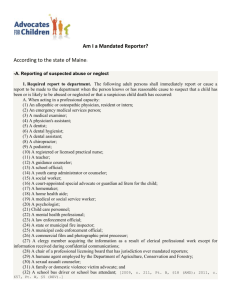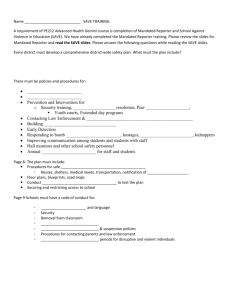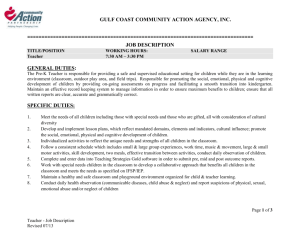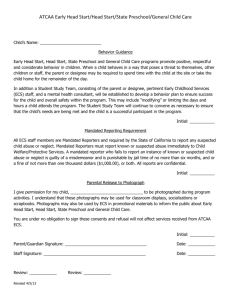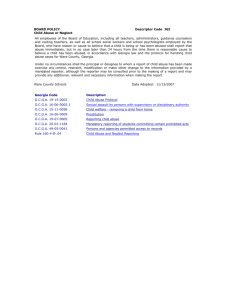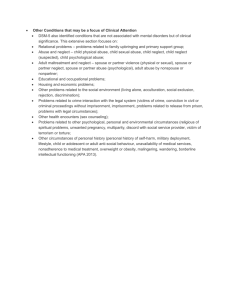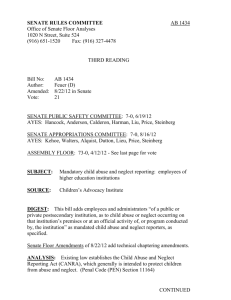assembly floor analysis
advertisement
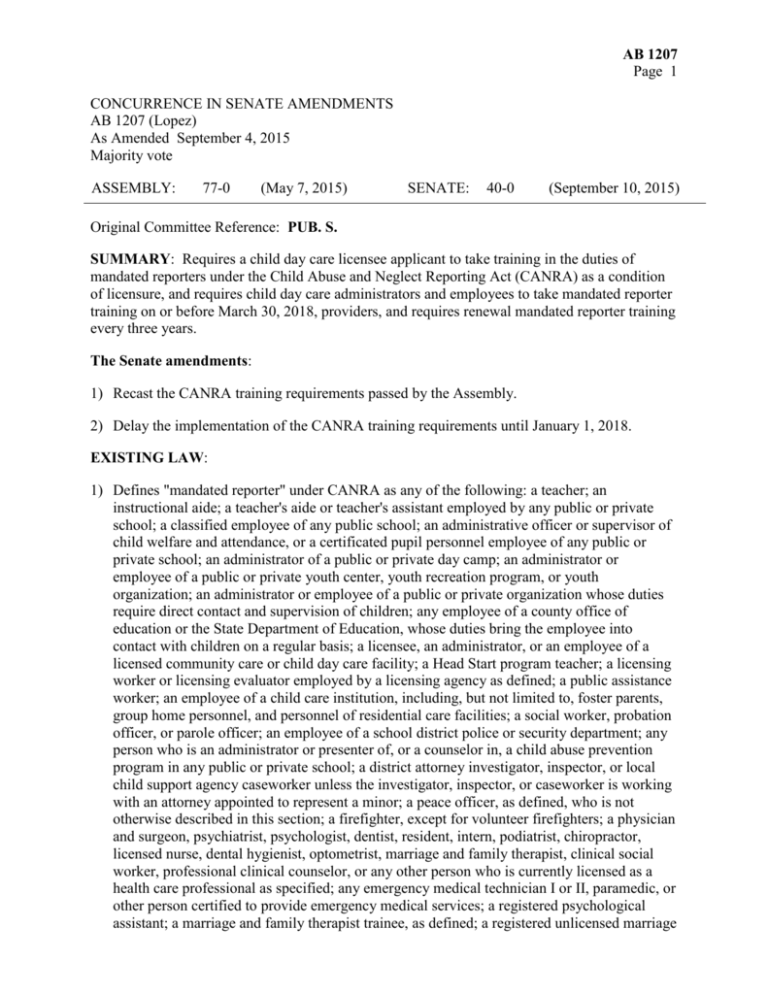
AB 1207 Page 1 CONCURRENCE IN SENATE AMENDMENTS AB 1207 (Lopez) As Amended September 4, 2015 Majority vote ASSEMBLY: 77-0 (May 7, 2015) SENATE: 40-0 (September 10, 2015) Original Committee Reference: PUB. S. SUMMARY: Requires a child day care licensee applicant to take training in the duties of mandated reporters under the Child Abuse and Neglect Reporting Act (CANRA) as a condition of licensure, and requires child day care administrators and employees to take mandated reporter training on or before March 30, 2018, providers, and requires renewal mandated reporter training every three years. The Senate amendments: 1) Recast the CANRA training requirements passed by the Assembly. 2) Delay the implementation of the CANRA training requirements until January 1, 2018. EXISTING LAW: 1) Defines "mandated reporter" under CANRA as any of the following: a teacher; an instructional aide; a teacher's aide or teacher's assistant employed by any public or private school; a classified employee of any public school; an administrative officer or supervisor of child welfare and attendance, or a certificated pupil personnel employee of any public or private school; an administrator of a public or private day camp; an administrator or employee of a public or private youth center, youth recreation program, or youth organization; an administrator or employee of a public or private organization whose duties require direct contact and supervision of children; any employee of a county office of education or the State Department of Education, whose duties bring the employee into contact with children on a regular basis; a licensee, an administrator, or an employee of a licensed community care or child day care facility; a Head Start program teacher; a licensing worker or licensing evaluator employed by a licensing agency as defined; a public assistance worker; an employee of a child care institution, including, but not limited to, foster parents, group home personnel, and personnel of residential care facilities; a social worker, probation officer, or parole officer; an employee of a school district police or security department; any person who is an administrator or presenter of, or a counselor in, a child abuse prevention program in any public or private school; a district attorney investigator, inspector, or local child support agency caseworker unless the investigator, inspector, or caseworker is working with an attorney appointed to represent a minor; a peace officer, as defined, who is not otherwise described in this section; a firefighter, except for volunteer firefighters; a physician and surgeon, psychiatrist, psychologist, dentist, resident, intern, podiatrist, chiropractor, licensed nurse, dental hygienist, optometrist, marriage and family therapist, clinical social worker, professional clinical counselor, or any other person who is currently licensed as a health care professional as specified; any emergency medical technician I or II, paramedic, or other person certified to provide emergency medical services; a registered psychological assistant; a marriage and family therapist trainee, as defined; a registered unlicensed marriage AB 1207 Page 2 and family therapist intern; a state or county public health employee who treats a minor for venereal disease or any other condition; a coroner; a medical examiner, or any other person who performs autopsies; a commercial film and photographic print processor, as defined; a child visitation monitor, as defined; an animal control officer or humane society officer, as defined; a clergy member, as defined; any custodian of records of a clergy member, as specified; any employee of any police department, county sheriff's department, county probation department, or county welfare department; an employee or volunteer of a Court Appointed Special Advocate program, as defined; any custodial officer, as defined; any person providing services to a minor child, as specified; an alcohol and drug counselor, as defined; a clinical counselor trainee, as defined; and a registered clinical counselor intern. 2) Provides that when two or more persons, who are required to report, jointly have knowledge of a known or suspected instance of child abuse or neglect, and when there is agreement among them, the telephone report may be made by a member of the team selected by mutual agreement and a single report may be made and signed by the selected member of the reporting team. Any member who has knowledge that the member designated to report has failed to do so shall thereafter make the report. 3) Provides that volunteers of public or private organizations, except a volunteer of a Court Appointed Special Advocate program, whose duties require direct contact with and supervision of children are not mandated reporters but are encouraged to obtain training in the identification and reporting of child abuse and neglect and are further encouraged to report known or suspected instances of child abuse or neglect to a specified agency. 4) Strongly encourages employers to provide their employees who are mandated reporters with training in the duties imposed by CANRA. This training shall include training in child abuse and neglect identification and training in child abuse and neglect reporting. Whether or not employers provide their employees with training in child abuse and neglect identification and reporting, the employers shall provide their employees who are mandated reporters with a statement that informs the employee that he or she is a mandated reporter and informs the employee of his or her reporting obligations and of his or her confidentiality rights. 5) Encourages public and private organizations to provide their volunteers whose duties require direct contact with and supervision of children with training in the identification and reporting of child abuse and neglect. 6) Requires a mandated reporter to make a report to a specified agency whenever the mandated reporter, in his or her professional capacity or within the scope of his or her employment, has knowledge of or observes a child whom the mandated reporter knows or reasonably suspects has been the victim of child abuse or neglect. The mandated reporter shall make an initial report to the agency immediately or as soon as is practicably possible by telephone and the mandated reporter shall prepare and send, fax, or electronically transmit a written follow-up report thereof within 36 hours of receiving the information concerning the incident. The mandated reporter may include with the report any nonprivileged documentary evidence the mandated reporter possesses relating to the incident. 7) Any mandated reporter who fails to report an incident of known or reasonably suspected child abuse or neglect as required by this section is guilty of a misdemeanor punishable by up to six months confinement in a county jail or by a fine of $1,000 or by both that imprisonment and fine. If a mandated reporter intentionally conceals his or her failure to AB 1207 Page 3 report an incident known by the mandated reporter to be abuse or severe neglect under this section, the failure to report is a continuing offense until a specified agency discovers the offense. 8) Defines "child" under CANRA to mean person under the age of 18 years. 9) Defines "child abuse or neglect" under CANRA to include physical injury or death inflicted by other than accidental means upon a child by another person, sexual abuse as defined, neglect as defined, the willful harming or injuring of a child or the endangering of the person or health of a child as defined, and unlawful corporal punishment or injury as defined. "Child abuse or neglect" does not include a mutual affray between minors. "Child abuse or neglect" does not include an injury caused by reasonable and necessary force used by a peace officer acting within the course and scope of his or her employment as a peace officer. AS PASSED BY THE ASSEMBLY, this bill: 1) Required the Office of Child Abuse Prevention (OCAP) within the Department of Social Services (DSS) in consultation with Community Care Licensing Division within DSS to do all of the following: a) Develop and disseminate information to all licensees, administrators, and employees of licensed child day care facilities regarding detecting and reporting child abuse. b) Provide statewide guidance on the responsibilities of a mandated reporter who is a licensee, administrator, or employee of a licensed child day care facility in accordance with CANRA. These guidelines shall include, but is not necessarily limited to, both of the following: i) Information on the identification of child abuse and neglect; and, ii) Reporting requirements for child abuse and neglect. c) Develop appropriate means of instruction child care licensees, administrators, and employees of licensed child day care facilities in detecting child abuse and neglect and the proper action that a child care licensee, administrator, or employees of a licensed child day care facility is required to take, including, but not limited to, using the free online Mandated Reporter "General Training Module" and "Child Care Professionals Training Module" provided by the OCAP. 2) Provided that a child care licensee shall do both of the following: a) Complete training, as specified, using the online training model provided by the OCAP and provide the training to their administrators, employees, and persons working on their behalf, who are mandated reporters of suspected child abuse and neglect, of the mandated reporting requirements. Completing mandated reporter training is a condition of licensure, and child care administrators and employees of licensed child day care facilities shall mandated reporter training during the first six weeks of employment. This training shall include information that failure to failure to report an incident of known or reasonably suspected child abuse or neglect, is a misdemeanor punishable by up to six AB 1207 Page 4 months confinement in a county jail, or by a fine of $1,000, or by both that imprisonment and fine. b) States that a child care licensee, administrator, or employee of licensed child day care facility shall take required the training as frequently as prescribed by regulations adopted by DSS. 3) Required the OCAP to develop a process for all persons required to receive CANRA training to obtain proof of completing the training as a condition of licensure, or within the first six weeks of that person's employment. The process may include, but is not necessarily limited to, a child care licensee applicant obtaining a certificate of completion and submitting the certificate to the DSS prior to acquiring a child care license. A child care administrator, or employee of a licensed child day care facility shall submit a current certificate of completion to the child care director or the licensee within six weeks of employment. A current certificate of completion for each child day care licensee, administrator, or employee of a licensed child day care facility, shall be submitted to the DSS upon inspection of the facility, when proof of other required training is submitted to DSS, or upon request of the DSS. 4) Required the DSS to issue a notice of deficiency at the time of a site visit to a licensee who is not in compliance with proof of training requirements. The licensee shall, at the time the notice is issued develop a plan of correction to correct the deficiency within 90 days of receiving the notice. The DSS may revoke the facility's license if the facility fails to correct the deficiency within the 90-day period. 5) Stated that a child care licensee, administrator, or employee of a licensed child day care facility who does not use the online training module provided by the DSS shall report to, and obtain approval from the DSS regarding the training that person shall use in lieu of the online training module. 6) Required the DSS to adopt regulations to implement the required CANRA training, and proof of completion of training requirements, including, but not limited to, defining "current certificate of completion" and prescribing how frequently a licensee is required to take the training. 7) Made conforming cross references. FISCAL EFFECT: According to the Senate Appropriations Committee: 1) One-time minor costs (General Fund), for the Department of Social Services (DSS) to develop and adopt regulations. 2) Minor ongoing workload for the DSS to disseminate information and offer the training course online. COMMENTS: According to the author, "Although licensees, administrators, and employees of licensed child day care facilities and employees of child care institutions are mandated reporters under California's Child Abuse and Neglect Reporting Act, the law does not require them to complete any training on recognizing the signs of child abuse or neglect or how to comply with mandated reporter requirements. AB 1207 Page 5 "California Community Care Licensing Division requires child care licensee applicants to sign a statement entitled 'Statement Acknowledging Requirement to Report Child Abuse.' However, without instruction or guidance on how to recognize the signs of child abuse and neglect, how to support a child and work with a family during or after a report, and how to make a report, many child care providers are unaware of what being a mandated reporter entails. This bill adds Health and Safety Code Section 1596.8662, amends Health and Safety Code Section 1596.866 to delete that training in identification and reporting of signs and symptoms of child abuse is optional, and amends Penal Code Section 11165.7 to require child care licensees, administrators, and employees of licensed child day care facilities to complete training in how to meet their responsibilities as mandated reporters. Analysis Prepared by: Gregory Pagan / PUB. S. / (916) 319-3744 FN: 0002251
